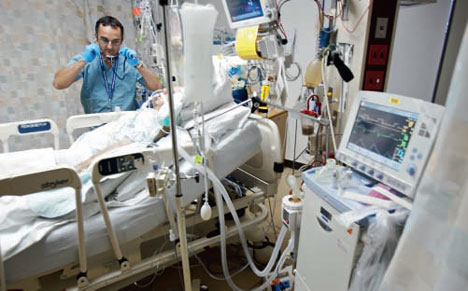Intensive care medicine

Patients are admitted to the intensive care unit if their medical needs are greater than what the general hospital ward can provide. Indications for the ICU include blood pressure support for cardiovascular instability (hypertension/hypotension), sepsis, post-cardiac arrest syndrome or certain cardiac arrhythmias.[4] Other ICU needs include airway or ventilator support due to respiratory compromise. The cumulative effects of multiple organ failure, more commonly referred to as multiple organ dysfunction syndrome, also requires advanced care.[4] Patients may also be admitted to the ICU for close monitoring or intensive needs following a major surgery.[5]
There are two common ICU structures: closed and open.[5] In a closed unit, the intensivist takes on the primary role for all patients in the unit.[5] In an open ICU, the primary physician, who may or may not be an intensivist, can differ for each patient.[5][6] There is increasingly strong evidence that closed units provide better patient outcomes.[7][8] Patient management in intensive care differs between countries. Open units are the most common structure in the United States, but closed units are often found at large academic centers.[5] Intermediate structures that fall between open and closed units also exist.[5]
Types of intensive care units[edit]
Intensive care is usually provided in a specialized unit of a hospital called the intensive care unit (ICU) or critical care unit (CCU). Many hospitals also have designated intensive care areas for certain specialities of medicine.[9] The naming is not rigidly standardized, and types of units are dictated by the needs and available resources of each hospital. These include:
- coronary intensive care unit (CCU or sometimes CICU) for heart disease
- medical intensive care unit (MICU)
- surgical intensive care unit (SICU)
- pediatric intensive care unit (PICU)
- pediatric cardiac intensive care unit (PCICU)
- neuroscience critical care unit (NCCU)
- overnight intensive-recovery (OIR)
- shock/trauma intensive-care unit (STICU)
- neonatal intensive care unit (NICU)
- ICU in the emergency department (E-ICU)[10]
